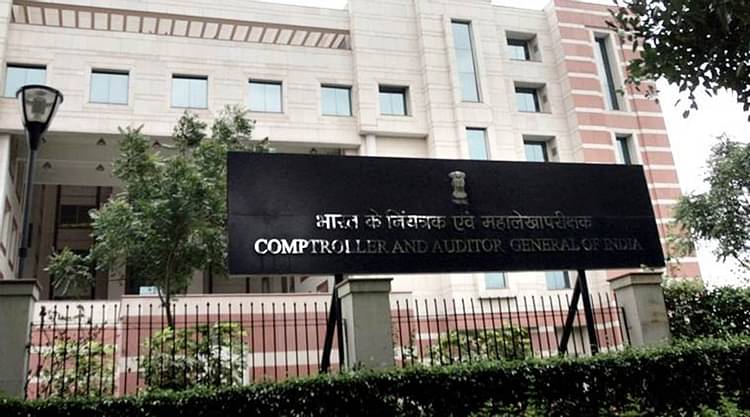
Kerala govt cries foul over CAG 'report' questioning infra board's functioning
If a series of ongoing investigations conducted by multiple central agencies was not enough, the Control and Auditor General’s (CAG) adverse remarks on the functioning of KIIFB (Kerala Infrastructure Investment Fund Board) has put the Kerala government in a fix once again.

If a series of ongoing investigations conducted by multiple central agencies was not enough, the Comptroller and Auditor General’s (CAG) adverse remarks on the functioning of KIIFB (Kerala Infrastructure Investment Fund Board) has put the Kerala government again in a fix.
The CAG report of 2018-19, which is yet to be tabled in the Kerala Assembly, has raised questions on the constitutionality of the provision that enables the KIIFB to issue ‘Masala bonds’ and go in for foreign borrowing, sources said. ‘Masala bonds’ are rupee-denominated bonds issued outside India.
The CAG charge and opposition reaction
The CAG report, which is yet to be available in the public domain, puts KIIFB in the dock for its provisions that allows it to borrow more than 3% of Gross State Domestic Product (GSDP), as mandated by the Fiscal Responsibility and Budget Management Act (FRBM Act) of 2016.
The Kerala government has termed the CAG’s criticism of KIIFB as a politically motivated ploy. The CAG has audited KIIFB eight times since the amendment to the FRBM Act in 2016, but never before has the national auditing body questioned the board’s constitutional validity, the state’s finance ministry stated.
The opposition parties in Kerala have accused finance minister Thomas Issac of ‘breach of privilege of the Assembly’ for making the CAG report public before it being tabled in the Assembly. Issac, on the contrary, argued that the CAG report sent to his office was a draft and not the final one. “There is no question of breach of privilege in disclosing the contents of the draft,” Issac said, adding that the four pages of the report, which criticise the KIIFB, were not there in the draft sent to the state government for queries. “The four pages were added later at the behest of the central government,” the finance minister said.
The CAG, on the contrary, says the report for 2018-19 sent to the Kerala government is the final report.
Also read: After Sibal’s salvo, Chidambaram’s broadside: Cong weakened on ground
RBI approval too under scanner
The CAG’s critical remarks have put not just the KIIFB but even the Reserve Bank of India (RBI) in the dock. Sources said the CAG puts RBI’s approval for KIIFB under the ‘questionable’ category. “The CAG has no right to challenge the legality of the approval given by RBI. The CAG has also no mandate to challenge the constitutionality of a statutory body and the corresponding Act. That can be done only by the High Court or the Supreme Court,” said a statement issued by the state finance ministry.
Why was KIIFB formed?
The KIIFB came into existence in 1999, under the Kerala Infrastructure Investment Fund Act 1999, to manage the Kerala Infrastructure Investment Fund. As per its website, the main intention of forming the fund was to provide investment for critical and large infrastructure projects in Kerala.
The objective of KIIFB is to mobilise funds for infrastructure development that includes major land acquisition needs of the state.
The office of the finance minister said that the CAG had audited the KIIFB eight times before the current audit. Why did the CAG then not raise these doubts before?
The office of the finance minister stated that KIIFB borrowing beyond the limit set by FRBM is not new. In fact, it is not a secret that the very objective of KIIFB is to find a legal and safe way of borrowing to meet the needs of the state beyond the limits set by the FRBM Act. The 2017-18 annual report of KIIFB states that ‘KIIFB functions as the key Special Purpose Vehicle (SPV) of the government for mobilising and channelling the funds for various projects with minimum project size worth above ₹100 crore’.
Also read: Reading BJP’s playbook: How party ‘manages’ allies, gains ground
The 2016 amendment to the FRBM Act enabled KIIFB to issue bonds and go in for foreign borrowings. Hence, the opposition parties are mute on the constitutional questions raised by CAG.
Writ petition in High Court
A writ petition has been filed in the Kerala High Court, challenging the constitutional validity of ‘Masala bonds’ under KIIFB. The petition argues that “such borrowing of capital is unconstitutional, arbitrary and illegal for being in direct violation of Article 293(1) of the Constitution of India and other provisions of the Constitution”.
The writ petition is filed by Ranjith Karthikeyan, a chartered accountant, who is said to be a member of Hindu Jagaran Manch. Interestingly, Mathew Kuzhal Nadan, the general secretary of Kerala Pradesh Congress Committee, is the counsel arguing the writ petition on behalf of Ranjith Karthikeyan. The LDF believes the Congress and the BJP have colluded to kill KIIFB.
Opposition parties have demanded the resignation of Issac for ‘breach of privilege’. Opposition leader Ramesh Chennithala termed the KIFFB a Pandora’s box. The Left has alleged that the Congress and the BJP are scared of the popularity of the Kerala government and its development projects.
Observers say the controversy surrounding KIIFB has a lot of political overtures as Kerala goes to polls next year.


